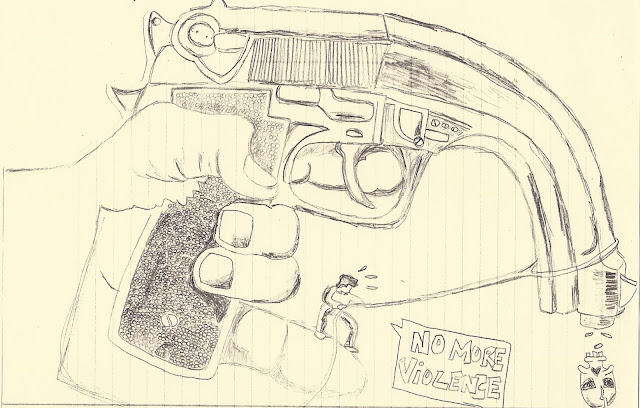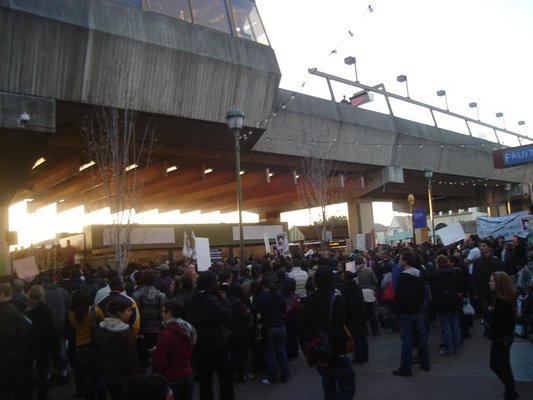 |
| Fruitvale Station Writer, Director, Ryan Coogler |
The movie, Fruitvale Station, the Trayvon Martin case, and the book, Dear Marcus: A Letter to the Man Who Shot Me all have a common denominator: African-American audiences, communities and readers are compelled to grapple with the devastation and long-term affects of gun violence.
Fruitvale Station, the Film Depicting the Shooting of Oscar Grant III
 Written and directed by Ryan Coogler, the film, Fruitvale Station, is
the story of 22 year old Oscar Grant (actor Michael B. Jordan), who was
shot in the back by a BART (Bay Area Rapid Transit System) police
officer as he (Grant) laid unarmed, restrained, and face down on the
platform of the Fruitvale Station, a public transit station located in
the Fruitvale District of Oakland, California.
Written and directed by Ryan Coogler, the film, Fruitvale Station, is
the story of 22 year old Oscar Grant (actor Michael B. Jordan), who was
shot in the back by a BART (Bay Area Rapid Transit System) police
officer as he (Grant) laid unarmed, restrained, and face down on the
platform of the Fruitvale Station, a public transit station located in
the Fruitvale District of Oakland, California.
After a New Year's celebration, Grant, his fiancee (actress Melonie
Diaz), and several of his friends are headed home. Grant is confronted
by a former white prison foe with whom he has an unresolved conflict. A
brief scuffle ensues between the two factions--Grant and his friends and
the provocateur and his companions. Grant and his friends are pulled
from the train by the police and detained. An angry verbal exchange
between the young men and the police leads to Grant's shooting.

Fruitvale BART Station, Oakland California where Oscar Grant
was shot and killed. Photo courtesy of Kevin Y. yelp.com
A scene from the movie, Fruitvale Station in which the young men
were detained by the policeafter being removed from the train.
Photo by Ron Koeberer, property of Weinstein Company.

A Scene from the movie, Fruitvale Station.
Photo by Ron Koeberer, property of Weinstein Company
Michael B. Jordan in a Scene from Fruitvale Station.
 |
| Photo Property of The Weinstein Company |
The film recounts the last day in the life of Oscar Grant III before he
was killed on January 1, 2009. It is candid and unpretentious in its
depiction of the young man and his struggles with fidelity, his
relationship with immediate and extended family, providing for the financial
needs of his own family, selling drugs, and incarceration. Grant loves
Sophina, his fiancee and mother of his four year old daughter, but their
relationship is tested when he is incarcerated, and after his release he is unfaithful and loses his job. His incarceration also caused friction with his
beloved mother, Wanda (actress by Octavia Spencer), who tells him she
will not continue to visit him in prison.
Scene from Fruitvale Station featuring actors Michael B. Jordan and Ariana Neal.
Scene from the movie, Fruitvale Station featuring actors Ariana Neal and
Michael B. Jordan. Photo by Cait Adkins, property of Weinstein Company.
With his love for his daughter, Tatiana (actress Ariana Neal) at the
core of his desire to really get his life in order, it seems that Grant
is finally doing just that. He and the family celebrate his mother's birthday
which falls on New Year's Eve, and he and Sophina mend their
relationship. Fruitvale Station is a sensitive portrayal of a
young black man navigating his way through and around the pitfalls and
obstacles which obscure life's paths. It is the story of a young man
ascending into manhood.
Oscar Grant III and Trayvon Martin
Unfortunately, Fruitvale Station
is also a distressingly true and sad story about another young person
being the victim of a shooting. While gun violence is a growing problem
in communities across America without regard to ethnicity, this film
prompts viewers to further examine the issue in Black communities. In
the wake of the Trayvon Martin shooting and the subsequent acquittal of
George Zimmerman, Martin's assailant, the film compels viewers to make
correlations. Martin was unarmed, walking home from the store with a bag
of Skittles and an Arizona tea; and he was wearing a hoodie, which
according to Zimmerman, aroused suspicion. Zimmerman pursued Martin
which eventually led to a confrontation that led to Martin's death at
the hands of the neighborhood watchman.
Trayvon Martin wearing a hoodie which some believe cost him his life.
In the film, Grant and his friends were unarmed, on their way home,
pursued and removed from the train because of the altercation, and never
questioned about what actually happened. After a verbal altercation,
Grant is shot and killed by the police officer. Trayvon Martin's shooter
was found not guilty. In the actual Oscar Grant case, charges against
Grant's assailant were reduced from first degree murder to manslaughter
and he served eleven months. The question that Black America raises in
each case: what would the justice system have done had the shooters been
Black? Both the Oscar Grant and Trayvon Martin cases generated outrage
and protests in communities in the immediate vicinity of the cases as
well as in other areas around the country.
Protest over the killing of unarmed victim, Oscar Grant, January 7, 2009
at the Fruitvale BART Station, Oakland, California. Photo courtesy of Jose C. yelp.com.
Protest over the killing of unarmed victim, Oscar Grant, January 7, 2009
at the Fruitvale BART Station, Oakland, California. Photo courtesy of Jose C. yelp.com.
Protest over the killing of unarmed victim, Oscar Grant, January 7, 2009
at the Fruitvale BART Station, Oakland, California. Photo courtesy of yelp.com.
Protest over the killing of unarmed teenager, Trayvon Martin.
Dear Marcus: A Letter to the Man Who Shot Me
A Gun Violence Victim Tells His Story
Elements of gun violence in the Black community which unquestioningly
cannot be ignored are the increasing numbers of young people who are
shot by peers in gang and drug related activities, or by unknown
assailants.
 The book, Dear Marcus: A Letter to the Man Who Shot Me,
by Jerry McGill (Random House, 2012) chronicles the life of a young man
who is paralyzed after being shot in the back at thirteen years old as
he walks home on New Year's Eve. The shooting occurs in what the
narrator describes as the Lower East Side of Manhattan which has sense
undergone gentrification. He never learns the shooter's identity or why
he was shot. He undergoes extensive physical, occupational, and
psychological therapy in which he has to relearn basic functions such as
brushing his teeth, bathing, and writing, and how to function with
limited mobility. For years he is bitter and searches for answers about
why he was targeted.
The book, Dear Marcus: A Letter to the Man Who Shot Me,
by Jerry McGill (Random House, 2012) chronicles the life of a young man
who is paralyzed after being shot in the back at thirteen years old as
he walks home on New Year's Eve. The shooting occurs in what the
narrator describes as the Lower East Side of Manhattan which has sense
undergone gentrification. He never learns the shooter's identity or why
he was shot. He undergoes extensive physical, occupational, and
psychological therapy in which he has to relearn basic functions such as
brushing his teeth, bathing, and writing, and how to function with
limited mobility. For years he is bitter and searches for answers about
why he was targeted.
Slowly, McGill begins to embrace his new life and make strides; some in
spite of his circumstances and others because of it. He earned his
bachelor's degree in English literature from Fordham University in the
Bronx, and his master's in education from Pacific University in Oregon.
He worked with the National Theatre Workshop of the Handicapped (NTWH);
the 52nd Street Project, a Manhattan theatre company which serves
impoverished youth and later became the production manager. At a high school in Queens, he taught theatre arts to a group of high school students with
disabilities, and worked for a company which facilitates international
travel for young people with disabilities. He is a writer and artist and
has become a role model for others with disabilities. Some thirty years
later, Jerry McGill shares his painful, yet inspirational
autobiographical account of his experience as a shooting victim. McGill
is available for select readings and lectures through the Random House
Speakers Bureau, 212-572-2013 or rhspeaker@randomhouse.com.
Dear Marcus: a Letter to the Man Who Shot Me was
assigned reading for incoming freshman who participated in the 2013
CASA (Center for Academic Success and Achievement) program at Morgan
State University. One of the requirements is
participation in book club in which students collectively read a book
and engage in discussion and activities.
As book club facilitator for the past three summers, it has been my
responsibility to develop a syllabus and implement the plans for fifteen
cohorts of about eighteen students apiece. Each year, the readings have
addressed specific issues affecting the African-American community.
This year we focused on gun violence. In cohort discussions and written
reflections, students discussed the book, shared their own experiences
with gun violence, suggested possibilities for addressing the issue,
developed artwork, poetry, collages, articles and other items for
display which were showcased at the graduation at the end of the program. Below are
some of the best submissions.
Information, Photos, Artwork Compiled by Students Against Gun Violence





Grandmothers Against Gun Violence website: http://www.grandmothersagainstgunviolence.org/



What Are the Solutions?
Self-inflicted violence in Black communities, primarily the urban centers of America, have reached an unprecedented high with daily reports of shootings. While some believe that the creation of jobs, better educational opportunities, mentoring programs, and positive activities are the answer, others believe that those types of efforts must be accompanied by a rebuilding the cultural integrity of an entire people and families, and restructuring communities. While jobs certainly are a crucial aspect of community and nation building, jobs alone do not create economic stability. Successful development and creation of businesses, manufacturing, distribution networks, and viable institutions that meet the needs of communities and individuals are the forerunners, foundations and sustaining mechanism for job creation.
Education must equip young people to innovate, create and serve their communities, families and institutions, not simply develop a career and look for someone to employ them. Education has to simultaneously develop skills, leadership qualities, the ability to analyze, think critically and problem solve while instilling values, integrity, direction, respect for life, a sense of purpose, and the desire for self-determination.
People who are the most fulfilled and successful have a great sense of their purpose in lives and feel they have control over their destinies. In the words of Kwame Toure, we must organize. Join an organization that works to fulfill the goals that you feel are most crucial, and if there is not one that meet your standards, start one. Addressing the issue of gun violence and other problems, building and sustaining our communities is each of our responsibility.












